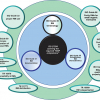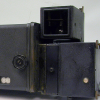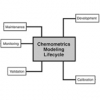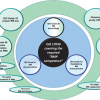Richard P. Meeres
Guest Columnist
Introduction
The United Kingdom has always played a leading role in the international chemical metrology community: for more than 40 years Peter Ridsdale of Ridsdale & Co./BAS was a figure of continuity, representing the United Kingdom on the influential ISO REMCO Committee from its inception in 1975. Sadly Peter passed away in June 2006. At the April meeting of the UK Reference Material Working Group, Richard Meeres reviewed the contribution that BAS and Ridsdale have made to chemical metrology over the last 95 years. I asked Richard, who has taken over the helm at BAS, to use his presentation as the basis of an article for Spectroscopy Europe, as I felt it deserved a wider audience.
The role of professional volunteer- ism in building and supporting the UK analytical chemistry community is often overlooked. The UK has a reputation for delivering world class analytical chemistry: without the contribution of many thousands of scientists, giving freely of their spare time to a range of professional bodies including the Royal Society of Chemistry, this reputation could not have been built. This article explains how BAS developed and maintained its pivotal position in the European iron and steel metrology community and explains in detail the important work done by its volunteers.
At the same time the article highlights a very important issue that causes concern in today’s chemical community: how do we maintain the level of volunteerism that is so important to maintain the infra- structure that we all rely on to support our profession? It is my experience and that of many other industry professionals that many organisations and employers today find it difficult to justify time spent
by staff on “professional” activities that do not directly generate value for the organisation. I am pleased that by print- ing this interesting article we have also been able to give a clear example of the role played by the many volunteers with- out whom the important metrology work carried out by BAS over the years would not have been possible. I hope also we may have encouraged and some readers to think about what they might do for their industry!
Peter J. Jenks, RM Column Editor
The US National Bureau of Standards (NBS), or the National Institute of Standards and Technology (NIST) as they are now known, was the first Organisation to produce Standard Samples, or Reference Materials as they are now known, back in 1901. These samples were mainly for consumption within the USA, but, as international demand grew, making them available in Europe became a priority. Without rapid transport links, delivery times could be protracted. At that time the United Kingdom was a major producer of iron and steel and, following some well-known engineering failures, including the Tay Bridge disaster and the unexpected loss of the RMS Titanic, more and more attention began to be directed towards the quality of the steel. After the necessary approaches, NBS proved to be more than willing to assist Mr C.H. Ridsdale, the first person in the UK to recognise the importance of such materials, to produce them within his independent analytical laboratory which he, together with his son Mr N.D. Ridsdale, had set up in Middlesbrough in 1912, initially to standardise methods of analysing elements in steels.
With guidance and co-operative analysis from NBS, several Standard Samples were produced by Ridsdale & Co., and as the recognition of the importance of such work grew, it was decided to set up an informal association of UK Co-operating Analysts under the title “British Chemical Standard (BCS) Movement”. The first BCS samples were issued in 1917 and soon gained recognition throughout the UK industry, such that the Iron and Steel Institute (ISI) decided to form a Technical Sub-Committee to consider the preparation of Standard Samples on a national basis. The possibility of merging the BCS Movement with the ISI Technical Committee was carefully considered, but was found to be impracticable. The two organisations then produced Standard Samples in parallel for a dozen or so years before the ISI Technical Sub- Committee was eventually disbanded after producing only 10 single element samples.
Following the death of Mr C.H. Ridsdale in 1934, it was decided to form a private limited company to ensure that the work of the BCS Movement would continue independent of any one individual. As a result, Bureau of Analysed Samples Ltd (BAS) was incorporated in 1935 under the Chairmanship of Mr T.G. Elliot, Chief Chemist of Hadfields Ltd with Mr N.D. Ridsdale as Managing Director.
On the death of Mr Elliot in 1941, he was succeeded by Dr E. Gregory, Director and Chief Metallurgist of Edgar Allen & Co Ltd, who also Chaired the Analysis Sub-Committee of the ISI and, later, the Methods and Analysis Committee of the British Iron and Steel Research Association (BISRA) which authorised the preparation of many standard methods for the analysis of iron and steel. Mr N.D. Ridsdale was also actively involved in these committees and in many cases BAS provided Standard Samples for the methods which were being developed and tested.
Throughout this period the demand for Standard Samples continued apace and expanded from the provision of finely divided (chip) samples for traditional classical chemical analysis to include also solid (disc and block) samples for spectroscopic analysis. There was no shortage, via the ISI and BISRA committees and via many industrial and research organisations, of analysts willing to give their time and experience to the British Chemical Standards Movement to ensure a continuous supply of these important products. Indeed, an informal Honorary Advisory Committee (HAC) was formed, though they met at first only during the Triennial Meetings of Co-operating Analysts, which started right from the beginning of the Movement in 1916. (These Triennial Meetings still persist today, with the 26th such event having taken place in York in 2005.)
In 1949, soon after Mr N.D. Ridsdale’s son Mr P.D. (Peter) Ridsdale joined the Board of BAS after a short spell in the army, the HAC was officially constituted on the basis of formal six-monthly meetings. This Committee, consisting of some eight to ten Senior Technical Staff from industrial and research organisations, provides guidance to BAS on the demand for Certified Reference Materials (CRMs) and technical developments within the industry, advice and selection of materials for CRMs, recommendations regarding laboratories to participate in certification analyses, evaluation of results received and, most importantly, the approval of CRM Certificates.
When the UK joined the European Common Market in 1973, BAS were asked to co-operate with the German Federal Testing Institute (BAM), and the French Iron and Steel Research Institute (IRSID), in the preparation of European (now EURONORM) CRMs under the auspices of the European Coal and Steel Community (now European Committee for Iron and Steel Standardisation). This European Group has now been swelled by the addition of Centre de Développement des Industries de Mise en Forme des Matériaux (CTIF) in France, and of the Nordic CRM Working Group.
The ECRM Producers’ Group, like the HAC, meets twice a year, and oversees all stages of the preparation and certification of EURONORM samples in a similar way to the activities of the HAC.
Besides introducing BAS into the European field, Peter Ridsdale was a leading light in the International arena, being a founder member of the International Organisation for Standardisation Council Committee on Reference Materials (ISO/REMCO) which was established in 1975 to encourage a broad international effort for the harmonisation and promotion of CRMs and their application. He participated in the preparation and revision of ISO Guides 30–35 on the preparation and use of CRMs, including ISO Guide 34 “General Requirements for the Competence of Reference Material Producers” which is now used to accredit RM producers worldwide. Indeed BAS were extremely proud to be amongst the first group of five UK RM producers to be accredited to ISO Guide 34. Although, by a tragic coincidence, the formalisation of this achievement came just two weeks after Peter Ridsdale’s death, in June 2006.
As an illustration of Peter Ridsdale’s immense contribution and dedication to the cause he was a Director of BAS for nearly 60 years, he attended every single one of 112 HAC Meetings which took place during his lifetime, all 63 ECRM Producers’ Meetings since BAS joined the European Group, and all but two ISO/REMCO Meetings. He has left behind a strong organisation, which is now run by his son-in-law Richard Meeres, a Chemistry Graduate from Oxford University who joined BAS in 1976 after several years industrial experience with Shell Chemicals and who became Managing Director in 1992.
The tradition of utilising the experience of figureheads within the analytical community, which had continued for over 30 years after the tenures of Mr Elliot and Dr Gregory through Mr Ben Bagshawe, (who was awarded an MBE for his services to analytical chemistry), has been re-established via Dr Malcolm Taylor, formerly Chief Chemist at Allvac Ltd, who has recently been appointed as a Director of BAS.










